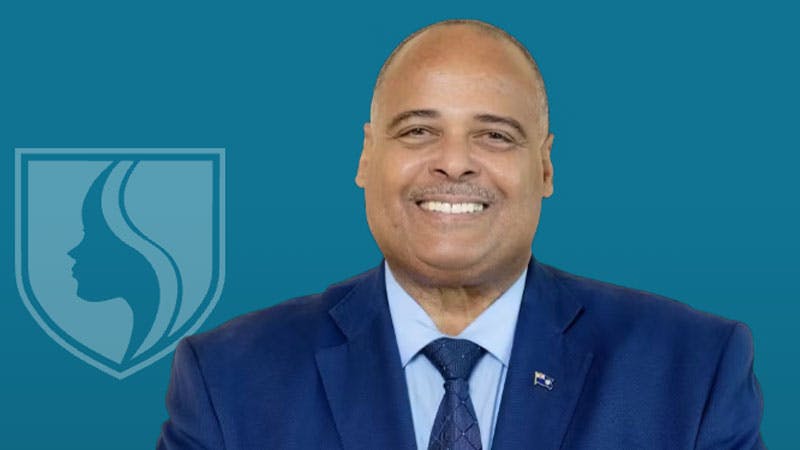
From his inspiration to pursue ENT to his role as a gateway to subspecialized care, Dr. Webster shares how he builds trust with patients, empowers families through education, and strengthens outcomes through team collaboration. Tune in to learn how a general ENT can make all the difference.
Shelby Stockton:
Welcome to the ENT Specialists Audio Blog. I'm your host, Shelby Stockton. Today I spoke with our newest addition, otolaryngologist, Dr. Ellis Webster. We discussed a wide range of topics including what inspired him to pursue an ENT career, how he builds trust with his patients, and the benefits of working with a multidisciplinary team. Dr. Webster provides insight into his practice and discusses why having a general ENT practitioner is so beneficial. Take a few minutes to listen to what Dr. Webster has to say. Hi, Dr. Webster. It is so nice to meet you.
Dr. Ellis Webster:
Hi, Shelby. Good to meet you too, and thank you.
Shelby Stockton:
Yes. I have a few questions for you I know that our patients are really interested in hearing. What inspired you to pursue a career in ENT?
Dr. Ellis Webster:
Well, I always wanted to do medicine, I think from the time I was young. I just liked interacting with people and trying to help them to be better. ENT though came in medical school. I liked the diverse nature of that specialty where you could treat adults and children and also do things in the ear, the nose, and the throat. I thought that gave me a broad scope.
Shelby Stockton:
What do you find most rewarding about general ENT practice?
Dr. Ellis Webster:
Definitely the ability to see patients when they come in, and then since the practice now has subspecialized doctors, I can then direct them to areas that they need specialized care, whether it's pediatric ENT for airway or it's the sinus - surgeons have to do specialized intricate sinus surgery.
Shelby Stockton:
How would you describe your approach to patient care and how do you build trust between you and your patients?
Dr. Ellis Webster:
Certainly, listening to the patient, that's important. I don't want to be telling the patient what I want; I want the patient to tell me why they're there. So I listen and then I give them the options of what I think the diagnosis is and then what the treatment options are and let them be part of the treatment plan, and I think that's how we build trust with the doctor and patient.
Shelby Stockton:
Communication is key for everyone, right?
Dr. Ellis Webster:
It is definitely.
Shelby Stockton:
What types of conditions or procedures do you most frequently treat?
Dr. Ellis Webster:
Well, I would treat ear pain, tonsillitis or sore throat, and sinuses. That seems to be big in Florida and elsewhere.
Shelby Stockton:
How do you help guide patients through their ENT journey from diagnosis to treatment and follow up?
Dr. Ellis Webster:
So a patient comes in and tells me what their symptoms are. I examine them. Then we come up with possible diagnosis, what we call the differential, and then from there I guide them as to whether they need to see a subspecialized ENT otolaryngologist, such as a pediatric ENT or a sinus rhinologist. And then I also would direct them to the literature because a lot of patients now they're on Google and they're looking at their conditions, and so I want to make sure that they get all the information that they can before so they can make an informed decision as to what the next step is.
And I'm there for them; I make myself available if the patient calls. I want to be able to respond to them, and if they have a question, I'm always available to make sure that their questions are answered. And their families also, because it's important, it's not just the patient and the patient is not just a diagnosis. It's a family and you have to make sure that the family is also brought in so they can help the patient through not only the diagnosis but through the treatment and also the post-recovery.
Shelby Stockton:
Yes, I've noticed with aging parents now I'm getting pulled into their doctor's appointments, so that is very important.
Dr. Ellis Webster:
Yes.
Shelby Stockton:
You're joining a practice with several fellowship-trained specialists. How do you see your role complementing theirs within the team?
Dr. Ellis Webster:
I see myself almost like the gatekeeper. I'm a general ENT. The patient sees me and I can see adults and children. Then I can tell from there if it's something that I can treat as a generalist, and if it's a patient that needs more specialized care, then I can direct them to someone within the same practice, within the same building. So it makes it easier on the patient. They don't have to be out searching and driving around. I can get them in with my colleagues and we can give them a multidisciplinary, multifaceted approach to treating the diagnosis.
Shelby Stockton:
Well, you just gave me the perfect segue for my next question. Can you talk about a time when collaboration within a multidisciplinary team made a difference in a patient's outcome?
Dr. Ellis Webster:
Yes, definitely. And not only when I was in residency and we needed all hands on deck to treat a patient, say with a head and neck cancer that had extended into the sinuses, but even in private practice. And so here, if we have a patient that may have an airway problem that needs to have an airway specialist, and the pediatric ENTs are very skilled and trained in that area. And then if we have a cancer, say an oral cancer, that I need to get the extension up into the sinuses, I can call on my colleagues who are trained as rhinologists and sinus surgeons to get in there. And also because they're so trained with using scopes, we don't have to do wide excisions. We can get in with a scope and do that work.
We also see that it’s helpful in a patient who may have a pituitary tumor and need access for the neurosurgeon to get into the cellar to remove the pituitary tumor, and the ENTs provide that access with scopes. And so using that multidisciplinary team can get it done with less, we say complications, and morbidity or mortality. Yes. So that is very helpful.
Shelby Stockton:
What do you think patients appreciate most about having access to a general ENT within a specialized practice?
Dr. Ellis Webster:
I think patients know that they can come in and that the general ENT can deal with them on that broad base, listen to all the concerns they have, and then direct them more specifically. Whereas if a patient has to think about the specific problem they have and then to have to find that person who deals with that specifically, it's harder. If you come to a general ENT who now can make the connections to the subspecialist, I think patients appreciate that more.
Shelby Stockton:
How do you approach educating patients about their condition, especially when it involves multiple treatment options?
Dr. Ellis Webster:
I try to listen to the patient and then I give them what the options are in terms of the treatments that are available, and I try to give it to them as simple as I can. And then from there, I direct them to how they can get more detailed information, whether that's on the internet, whether that's in books, and whether that's seeing another subspecialist. And so that way a patient is well-informed and then can make the decision along with the physician, me, for best treatment option and then the best outcome possible.
Shelby Stockton:
What are you most excited about as you begin this new chapter with the practice?
Dr. Ellis Webster:
Well, I'm excited about joining my colleagues. I have known them in terms of their reputation, which is excellent in the community. I've talked to patients that they have treated and helped, and certainly I am joining that practice. I'm excited to be part of it so that we can help people in the community who have ENT diseases and they need to be better and feel better.
Shelby Stockton:
Well, before I let you go, will you please answer one more question? How do you see yourself making a difference in the community you'll be serving?
Dr. Ellis Webster:
Well, as a general ENT, I come in and be able to see those patients and as I said, as a gatekeeper, I can direct them to more specialized services if needed. I also can provide the services and the ENT care that the community needs. I know that there are a lot of sinus problems, allergy problems, thyroid problems, and so I think as a general otolaryngologist, it might be easier to get access to me and make an appointment with me, so the patient doesn't feel they're waiting for too long to see the subspecialist. So I think that's how I intend to contribute.
Also would like to spend time in the community educating on things like hearing loss and head and neck cancer and certain ways to avoid having the problems that we see come into the ENT office. So prevention I think is better than cure.
Shelby Stockton:
Definitely. Definitely. Dr. Webster, we really appreciate your time. We welcome you to the community and we're excited to have you.
Dr. Ellis Webster:
Thank you very much, Shelby. It's such a pleasure and I look forward to starting to do the work.
